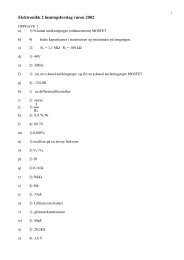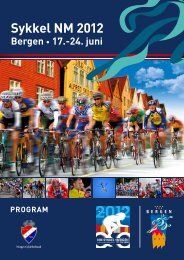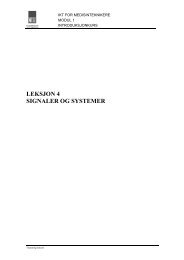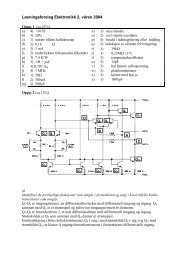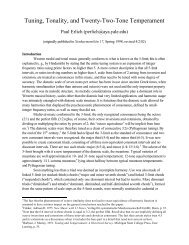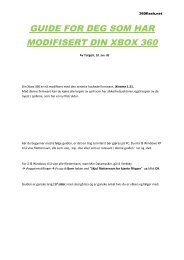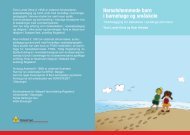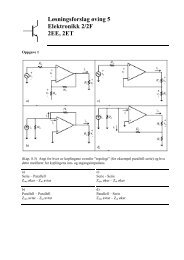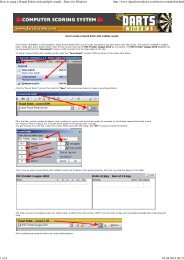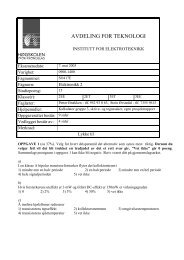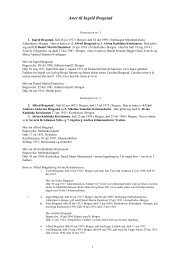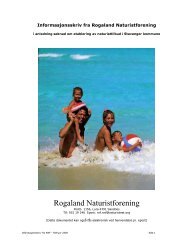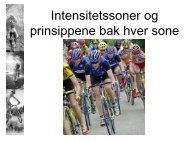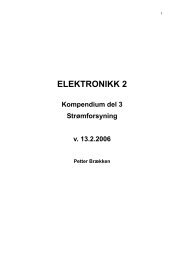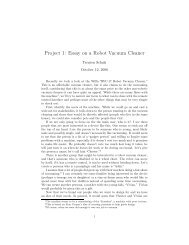The Online World resources handbook
The Online World resources handbook
The Online World resources handbook
Create successful ePaper yourself
Turn your PDF publications into a flip-book with our unique Google optimized e-Paper software.
Finding a needle ... (Part II) http://home.eunet.no/~presno/bok/10b.html<br />
occurrences of the terms used and also their position in the document. It provides<br />
somewhat the same results as AND searching. Also, it offers the benefits of OR<br />
searching as all the terms in a query need not be present in the result.<br />
Alta Vista offers both boolean and enhanced relevance ranking searches. For<br />
example, you can require that selected terms be found in the results. <strong>The</strong> query "+apples<br />
+bananas oranges" will not find a document missing the words apples and bananas.<br />
Those files that contain oranges will listed before those that do not contain this word, but<br />
files without this word will also be listed.<br />
Some services let you search specific types of information. For example, Alta Vista<br />
allows searches for characters or words in an URL (a Web address), or a hyperlink.<br />
Application: My Web pages are at http://home.eunet.no/~presno/. <strong>The</strong><br />
query "+link:eunet.no/~presno/ url:eunet.no/~presno/" will most likely find<br />
all links to my pages on other Web servers except my own. <strong>The</strong> " "<br />
character in front of a word works as a NOT operator. <strong>The</strong> "link:" phrase is<br />
for searching in hyperlinks across the Internet. <strong>The</strong> "url:" code lets you<br />
search in the URL addresses of the found pages.<br />
Key Word In Context (KWIC) searching will return the key word and N words near the<br />
key word to give the user the context in which the key word was found.<br />
Phrase Searching allows searching of phrases when available. Note that some<br />
systems can be confusing if you think "<strong>Online</strong> <strong>World</strong>" is searching the two words<br />
together as a phrase, when in fact the engine is searching <strong>Online</strong> OR <strong>World</strong>.<br />
Fuzzy searching is another interesting concept. This option allows you to search<br />
when you don't know the exact spelling of the word. Some systems use the Soundex<br />
algorithm invented over 70 years ago to search name files. Names that sound alike<br />
should have the same Soundex number. It uses these basic rules:<br />
Vowels are ignored.<br />
Consonants that sound alike in a pronounced name have the same "number".<br />
Successive consonants with the same number are counted as one (Willitt is equal<br />
to Wilith).<br />
Note: Information in English may be just a small part of that available in a country's<br />
national language. When English language sources fail to meet the need at hand,<br />
consider the services of a skilled bilingual searcher.<br />
Spelling errors are very common reasons for search failures. Make sure you have<br />
that terminology term or person's name right. Also, names are not spelled the same way<br />
in all countries, and those who produce texts also make spelling errors. For example, the<br />
name of the composer Tchaikowsky is supposedly spelled in 36 different ways on the<br />
nets. 'Ciaikovsky' is one of them.<br />
Important: Some users get so fascinated by advanced methodology used<br />
by a search engine that they forget the purpose of the task: to find good<br />
and relevant information. If a search engine does not hold this information<br />
in its database, then it having the best search features on the net does not<br />
justify using it!<br />
Bare Bones 101 is a collection of lessons designed to help users get their web searches<br />
on the right track quickly and easy. <strong>The</strong> tutorial has 20 independent lessons, addressing<br />
topics such as meta searchers, subject directories, evaluating sites, Boolean logic, and<br />
field searching. It offers overviews of the most popular search engines.<br />
Searching file libraries<br />
<strong>The</strong> commands used to find files are similar to those used in traditional databases. Often,<br />
you can limit the search by library, date, file name, or file extension. You can search for<br />
text strings in the description of the contents of a file, or use key words.<br />
On the Internet, the Virtual Shareware Library LV D IDYRULWH ,W OLQNV WR D IURQW<br />
end which catalogues about 120,000 software files available from the 22 largest<br />
shareware and freeware archives on the Internet (1996). Its search engine lets you<br />
3 of 13 23.11.2009 15:47



